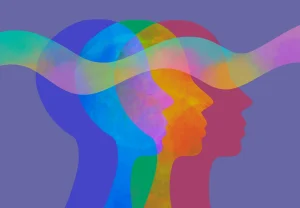By: Amanda Wiegert, LMHC, NCC
Do you find yourself struggling to cope with a loss and grief in your life? Are you experiencing low motivation, lack of energy, difficulties sleeping, anxiety, or social isolation? When we hear the term “grief and loss” we often think about loss of life, death, and dying. However, we experience grief in many ways throughout our lives such as loss of a job, infertility, divorce, loss of a pet, moving to a new home, loss of identity, and loss of life.
Loss is an inevitable part of life and dealing with the grief that comes with loss is a natural part of the healing process. Here are a few ways to help yourself or a loved one deal with the overwhelming feelings that can come when dealing with grief and loss.
Acknowledge Your Feelings
The grief process looks different for everyone however anger, sadness, guilt, anxiety, difficulty concentrating, lack of energy, and hopelessness are all very common reactions to loss. Some people may be able to move through the stages of grief rather quickly while others make take years to fully process and come to terms with their loss.
Whatever your grief looks like, you must give yourself permission to grieve and to feel the emotions that come with the process. Denying our emotions or pushing them away as if they don’t exist is only going to make the healing process more difficult.
Utilize Healthy Ways of Coping
Often times when we are grieving, we can turn to unhealthy ways of coping in order to push our feelings away. Some examples of these unhealthy coping skills are: using drugs and alcohol, self-harm, and over-eating or under-eating. These unhealthy ways of coping are only masking the feelings temporarily but they are not dealing with the reason why those feelings are present.
Instead, focus on finding healthy ways of coping such as exercise, meditation, spending time with loved ones, or reading a good book. These healthy coping skills will allow you to work on your overall physical and mental health while also giving you an outlet to express the emotions that you may be feeling throughout the grieving process.
Remember You Are Not Alone
Dealing with loss can be a very lonely process. Often times we will try to isolate ourselves from others because we don’t want them to see our emotions and how “broken” we are. It is important to lean on those closest to you for support and to allow others to comfort you and help you through your process of grieving. Isolation can cause the emotions to escalate and in time, can complicate the grief process.
Ask For Help In Your Grief
Do not be afraid to reach out and ask for help dealing with your grief. Sometimes the thoughts and emotions surrounding the loss do not get better with time and turn into ‘complicated grief’. Complicated grief can manifest itself in many ways including difficulty keeping up your normal routine, feelings of hopelessness and depression, continuous self-blame, and even thoughts of self-harm.
The length of time that you need in order to grieve the loss will differ depending on the person and the situation. It is important to remember to be patient with yourself as you experience the various thoughts and emotions that come while moving through the stages of grief.
With time and healing, the waves of grief will become farther apart and their intensity will diminish. It may be helpful to speak with a professional who can walk with you through the grief process and show you ways to deal with the strong emotions that consume us when dealing with a loss.
If you are struggling to cope with a recent loss in your life, call Life Counseling Solutions today to schedule an appointment with Amanda (407) 622-1770 or fill out our info form here.
 About the Author: Amanda is passionate about helping people navigate all stages of life. She believes great healing can emerge from trauma and challenges if we allow ourselves to be open to learning and exploring new ways of dealing with difficult life experiences. She believes that therapy should be a collaborative approach between the client and the therapist to facilitate dialogue that leads to growth and positive change. Read more about Amanda..
About the Author: Amanda is passionate about helping people navigate all stages of life. She believes great healing can emerge from trauma and challenges if we allow ourselves to be open to learning and exploring new ways of dealing with difficult life experiences. She believes that therapy should be a collaborative approach between the client and the therapist to facilitate dialogue that leads to growth and positive change. Read more about Amanda..






